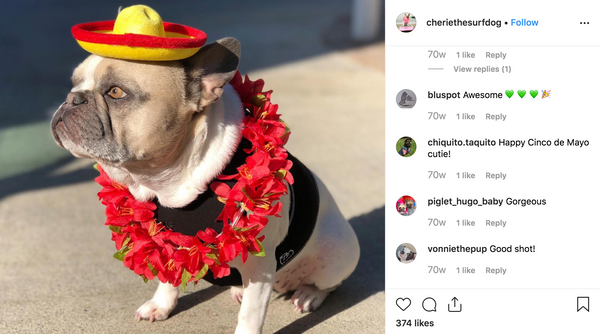Long-Live Your Healthy Bulldog
...
An English Bulldog's lifespan (on average) is between 8 and 10 years. For Frenchies, the average is 12. To offer a better understanding, tiny dogs such as Chihuahua’s have a life span of up to 20 years old. Conversely, larger dogs such as Mastiffs have a lifespan as short as 5 years.
So, when it comes to lifespan, size does indeed matter for bullies. However, it's quite crucial to understand that just like every humans' uniqueness, every dog is different from one another, as every breed is different. For bullies, helping them live a fulfilling and long life means tending to their unique physical and emotional needs. Just like for us humans, the latter is very important.
While a bullie's lifespan may only be 8-10 years, many have lived as long as 16-17 years. We all want our bulldog's to be here with us for as long as possible because let's face it... everyone will tell you that their dog makes them happy regardless of their size, breed, or age. However, as we bulldog-owners know, there is something very special about the bulldog breed. Bulldogs really do make you feel loved and happy and there's no denying that. Their 'shorter' lifespans on average just gives us another reason to appreciate their presence on the daily that much more.
Keep in mind the following tips to help your bullie reach a long life:
ONE. Don't put-off your bulldog’s health
Due to the bulldog’s short stature and innate brachycephalic nature, unfortunately, they are prone to health issues. Real attempts in understanding the breed’s common health conditions such as elongated soft palate, stenotic nares, narrow trachea, obesity, cardiac and respiratory disease, are important in pinpointing the proper causes/treatments etc to achieve in having the healthiest and happiest bullie. You will likely come to find your bullie shows eye or skin irritations, wheezes, slobbers, or has major gas problems. It is important to be cognizant and not allow something you may feel is 'normal' to be ignored.
Take your bullie to the vet regularly, and be quick to check up on any concerns. If cost is an issue, there may be options online for pro-bono or low-cost travel clinics in your area.
TWO. They are what they eat. Offer your bulldog nutritional food
English Bulldogs are notorious professional food/treat-scopers. When pondering a healthy diet for your bullie you should really take into account the portions and frequency of their eating schedule. The standard for feeding a bulldog is 20 to 70 calories per pound, daily. Of course, this is dependent on how active your bulldog is and the frequency in which they receive their appropriate exercise. You should also feed your dog several times a day, as opposed to feeding them a bigger meal once a day; the latter can cause digestion issues and long-term health affects.
THREE. Understand your bulldog’s genetics
BE OBSERVANT AND DILIGENT. As mentioned with health issues, it is important to understand your bulldog’s history, if for anything to understand potential genetic health issues that may plague your dog later in life. Genetic conditions for our bullies can affect nearly their entire body (i.e. a skin infection that begins in a specific area on your bulldog can and will spread throughout their body after time if not treated properly). In addition to hereditary respiratory and cardiac conditions, your bullies' ancestry may include skin, reproductive, and digestive conditions.
FOUR. Reciprocate the emotional support
Bulldogs are loveably sweet, cuddly, and need your emotional companionship just as much as you need theirs. They are, after all companion dogs, and offer unconditional love to us. So what's to say they don't need and deserve the same reciprocation? The emotional well-being of your dog will have a strong influence on your dog’s stress level and their actions can be very telling. They are likely to shadow those who stimulate an increase in their oxytocin levels (the hormone that plays a strong role in the altruism, bonding, and trust between a mother and infant). So the next time your bullie follows you around, take it as a huge compliment and give your bullie a hug and ear-rub for loving you so hard! Most bulldogs tend to be such chill pets that owners will often forget they are around (until they need something, of course). So, it’s important your bullie is given consistent affection and positive, nurturing attention.
The more tug-of-war and shared nap-times you can get in with your bullie, the better off they will be long term.
FIVE. Move their booties
Alright, so your bullie is probably more inclined to get comfortably situated on the couch than they are willing to go on a long walk in the neighborhood. However, this does not mean that you shouldn’t try. All dogs need exercise, so try to get in a routine that is manageable for the both of you. Use positive reinforcement (such as treats or rubs) to get your bullie out and about. Sometimes, tricking your dog with the sound of your dangling car-keys can help gain more traction with starting a walk as well. Be consistent and once a routine is in place, your bullie will learn to expect walks as part of their daily schedule and it will be less daunting as time goes by.


3 comments
I need to spend more time with my bulldog
Hello. I was looking for a carving example of a bulldog to carve and put on the end of a flute. We just lost our Rufus on Valentines day..:-(. My wife and I are both heartbroken. When he first wandered into our yard almost 6 years ago we didn’t plan on keeping him. But 2 weeks later when no one claimed him everyday I worried that I would get a call or inquiry from one of the posters or calls I put out that we found him. We had great times…I could have done better by him as far as excersise and sharing my dinners with him every nite but I’ll try to do better next time. Cheers, Sonny Sisneros
TY….. emotional side for the bulldog was helpful